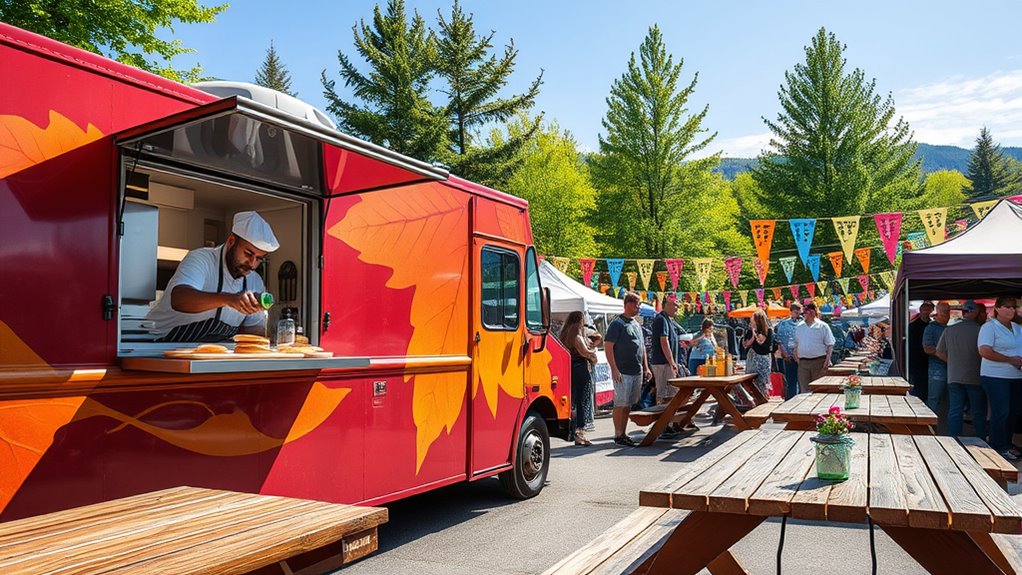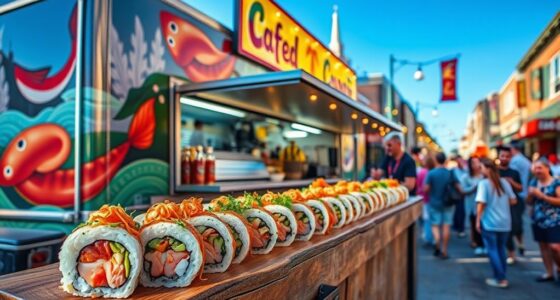In Stowe, Vermont, you’ll discover a vibrant food truck scene celebrating local flavors like maple syrup, cheeses, and regional meats. Many trucks incorporate Vermont’s rich maple heritage into sweet and savory dishes, from maple BBQ sauces to artisanal maple snacks. These food trucks often showcase seasonal events and festivals that highlight artisan products and community traditions. Keep exploring to uncover how Vermont’s maple culture continues to inspire innovative bites and unforgettable culinary experiences.
Key Takeaways
- Stowe’s food trucks feature local ingredients like Vermont maple, cheese, and artisanal bread, showcasing regional flavors.
- Maple syrup is used in diverse dishes, from sweet desserts to savory BBQ sauces, highlighting local culinary traditions.
- Seasonal festivals and open house events offer tastings, demonstrations, and cultural experiences centered around maple and artisan foods.
- Artisanal maple products like maple popcorn and leaf-shaped candies promote cultural heritage and support small local producers.
- Food trucks and markets serve as vibrant platforms for community engagement and preserving Vermont’s maple and artisan food traditions.
The Rich Heritage of Maple Syrup Production in Vermont
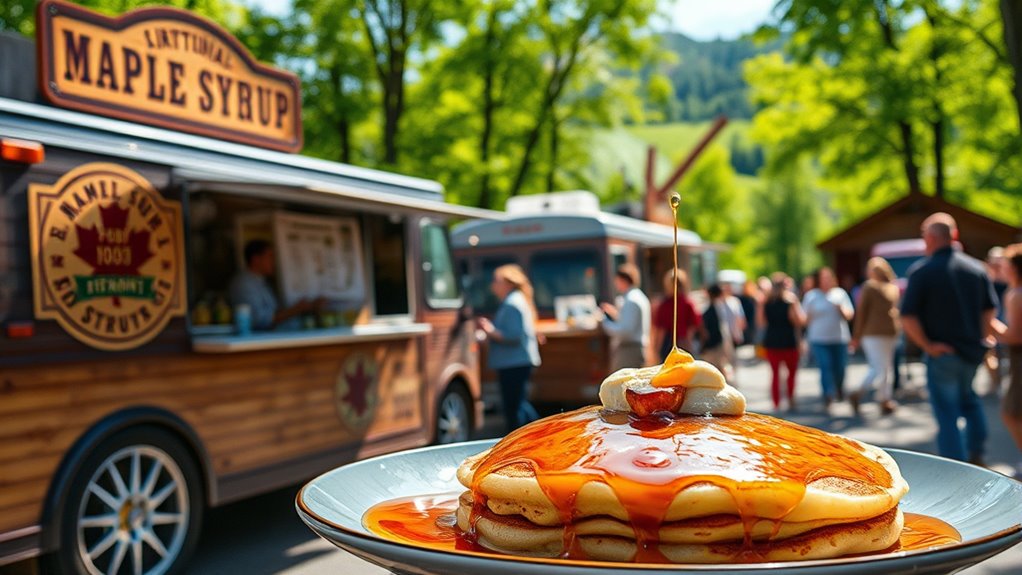
Vermont’s rich heritage of maple syrup production dates back centuries, rooted in the traditions of Native American tribes like the Abenaki. You can imagine how they tapped into nature’s resources, making V-shaped grooves in trees and boiling sap with hot stones to create syrup and sugar long before Europeans arrived. When settlers came in the 17th century, they learned these techniques, improving them with metal kettles and wooden buckets. By the 1800s, maple sugar became a key economic resource, especially as cane sugar grew less popular. Vermont’s industry expanded, producing millions of pounds of maple sugar and later shifting to syrup, which gained international recognition. This deep-rooted history continues to influence Vermont’s identity, celebrated through festivals and traditions that honor its enduring maple heritage. Vermont’s leadership in the industry has helped shape its reputation as a premier maple producer.
Modern Techniques and Innovations in Maple Tapping and Boiling
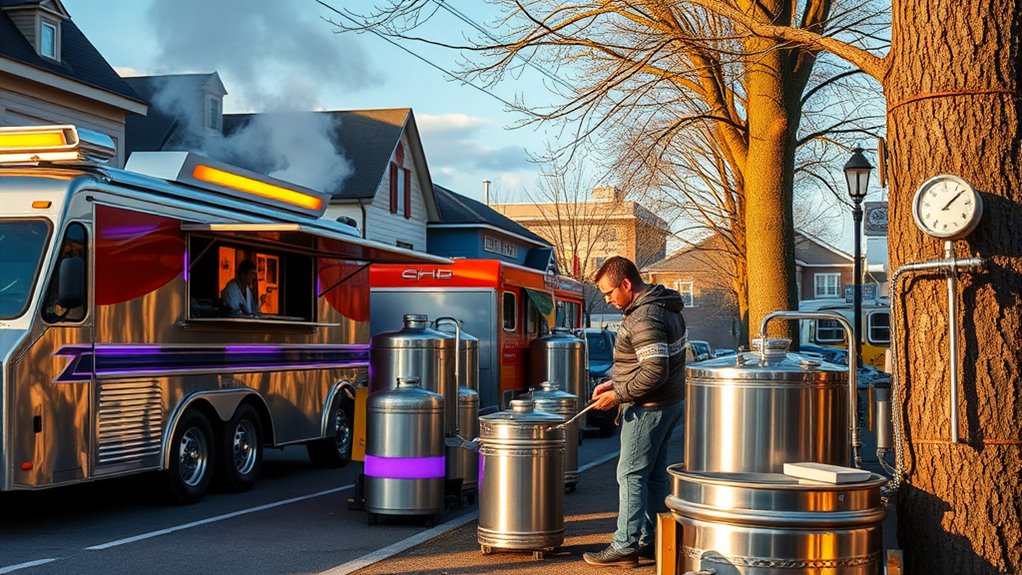
Modern techniques in maple tapping and boiling have revolutionized how producers harvest and process sap, making the industry more efficient and sustainable. You’ll find that precision drills create tap holes that maximize sap flow while minimizing tree damage. Spouts guide sap into buckets or tubing systems, with vacuum pumps boosting extraction beyond natural pressure, increasing yields. Only trees at least 10-12 inches in diameter and about 40 years old are tapped to ensure sustainability. Large operations connect hundreds or thousands of taps via tubing to central tanks. Reverse osmosis (RO) is commonly used to concentrate sap, removing water before boiling, reducing energy and time. Advanced evaporators with flow channels, automation, and biomass fuels speed up boiling. Modern filtration techniques clarify syrup, enhancing quality and shelf life, all contributing to a more efficient, eco-friendly industry. Additionally, implementing sustainable practices helps preserve forest health and ensures long-term productivity.
The Vibrant Food Truck Scene in Stowe Featuring Local Flavors

You’ll notice that Stowe’s food trucks highlight local ingredients like Vermont maple and fresh produce in their menus. Seasonal festivals and events showcase these flavors, drawing visitors enthusiastic to taste authentic local fare. This vibrant scene creates a delicious connection between the community’s harvests and your culinary experience. Incorporating ambient sounds from the region can further enhance the sensory appeal of these food experiences for visitors.
Local Ingredients Showcase
Stowe’s food trucks proudly highlight local ingredients, transforming fresh Vermont produce into vibrant, flavorful dishes. You’ll find maple syrup used not only in sweet treats but also in savory sauces like maple BBQ on tacos and sandwiches. Vermont dairy—cheddar cheese and artisanal cheeses—adds rich, creamy depth to sandwiches and salads, while seasonal vegetables like asparagus and bell peppers bring color and freshness. Many trucks support local farms by sourcing regional meats such as jerk chicken and pulled pork, often seasoned with Vermont-grown spices. Artisanal breads and rolls from small Vermont bakeries are common, elevating every bite. This focus on local ingredients creates a culinary experience that celebrates Vermont’s rich agricultural heritage, blending fresh flavors with innovative, globally inspired dishes. Additionally, the emphasis on local food sourcing ensures sustainability and supports the regional economy.
Seasonal Food Festivals
During Stowe’s seasonal festivals, food trucks take center stage, offering a lively array of local flavors that reflect Vermont’s rich agricultural heritage. As you wander through events like the Fourth of July Celebration or the Foliage Arts Festival, you’ll find:
- Food trucks serving regional cuisines, from Vermont cheeses to international dishes at the Balloon Festival.
- Vendors featuring craft beers, artisanal pizzas, and local dairy products, supporting small producers.
- Diverse menus that adapt to seasonal ingredients, highlighting summer berries or fall squash.
- Food trucks creating a vibrant, social atmosphere, encouraging conversations during parades, rides, and artisan markets.
- The dynamic food truck scene exemplifies how maximize space and organization to serve a variety of culinary delights efficiently and attractively.
These festivals not only showcase Vermont’s culinary diversity but also allow you to experience the authentic flavors and community spirit that make Stowe’s food truck scene so special.
Artisanal Maple Products and Unique Food Pairings in Stowe

Nestled in the heart of Vermont, Stowe has built a reputation for exceptional artisanal maple products that showcase traditional craftsmanship and local flavor. Nearby Waterbury, small-batch producers like Stowe Maple Products use centuries-old evaporators to craft unique syrups, maple popcorn, and leaf-shaped candies. Vermont’s 2023 production of over 2 million gallons highlights the region’s rich maple heritage, with Stowe’s artisans emphasizing quality and local taste. Food trucks and shops in Stowe combine these maple delights with savory dishes, such as glazed meats and maple mustard sauces, or sweet treats like maple ice cream and baked goods. Maple butter and cream are popular spreads, often paired with Vermont cheeses or drizzled over breakfast favorites, creating a vibrant, flavorful culinary scene rooted in tradition. Incorporating farmhouse-inspired textiles, such as cozy dish towels and rustic serving ware, can further enhance the authentic Vermont maple experience.
Seasonal Events and Festivals Celebrating Vermont’s Maple Culture
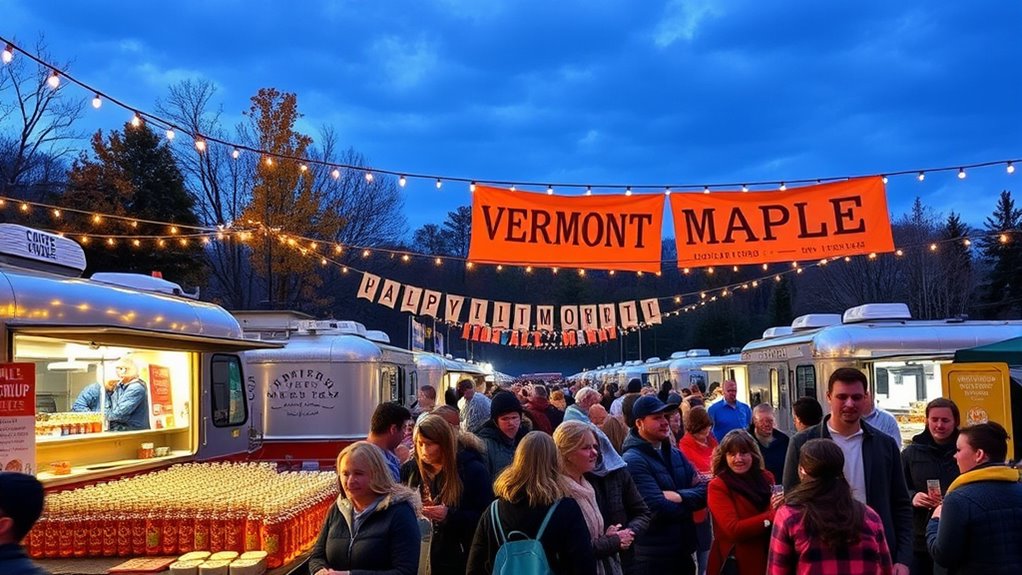
Ever wondered how Vermont celebrates its rich maple heritage? You’ll find lively festivals and events that showcase the state’s sweet traditions. During the Vermont Maple Festival in St. Albans, you can experience:
Discover Vermont’s vibrant maple traditions through lively festivals and sweet celebrations.
- Maple beverage tastings and pancake breakfasts
- Sugarhouse tours and cooking demos focused on syrup
- A grand parade, carnival, face painting, and vendors selling maple products
- The Sap Run, an 8.5-mile race with maple-themed refreshments
In late March, the Spring Maple Open House Weekend invites you to visit sugarhouses across Vermont, taste fresh syrup, and see tapping and boiling demonstrations. These events connect communities and highlight Vermont’s proud maple culture.
The Economic and Cultural Impact of Maple and Artisan Foods in Stowe
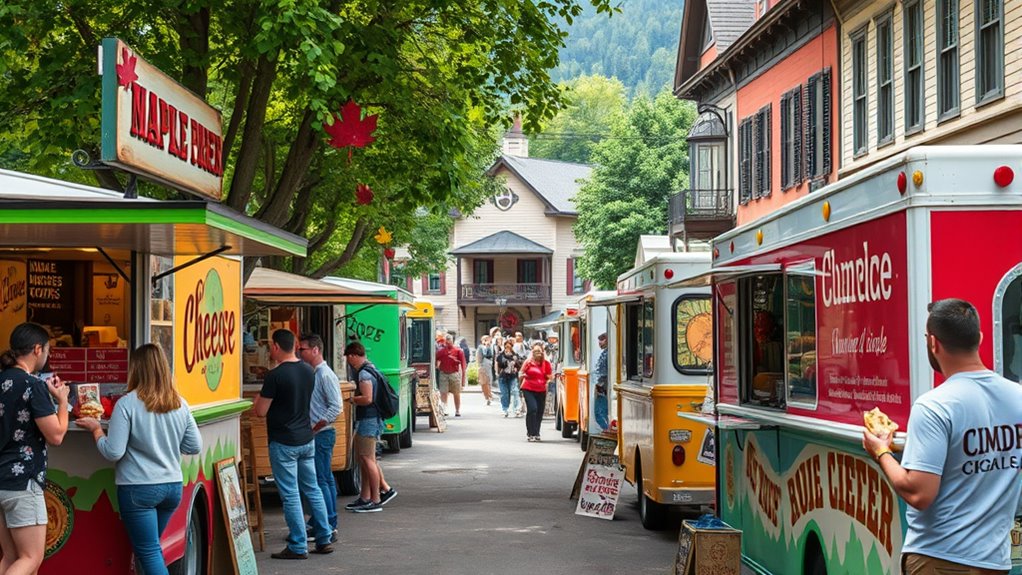
You can see how maple and artisan foods play an essential role in Stowe’s economy, supporting thousands of jobs and attracting investments. These foods also help preserve Vermont’s rich cultural heritage and foster a strong sense of community pride. As tourism grows, these local products continue to shape Stowe’s unique identity and economic vitality. Additionally, the tradition of creating and celebrating butter art underscores the deep cultural significance of dairy products in the region.
Economic Contributions and Growth
The maple industry in Stowe plays a crucial role in boosting the local economy through job creation, tourism, and artisan food markets. You’ll find that Vermont produces nearly 2 million gallons of maple syrup annually, supporting thousands of jobs across farms, processing plants, and equipment manufacturing. This industry’s employment multiplier of 1.25 means each direct job sustains additional positions in the community. Additionally, over 100 businesses contribute to maple-specific equipment and supplies, fueling upstream economic activity. You’ll also see how seasonal tourism spikes during sugaring season, with visitors enjoying tours, tastings, and maple-themed events, boosting hospitality and retail. The rise of artisan maple products further enhances product value and market reach, creating a diverse, thriving economic landscape in Stowe. Regulatory frameworks help ensure the quality and safety of maple products, fostering consumer trust and industry sustainability.
Cultural Heritage Preservation
How does maple sugaring serve as more than just an economic activity in Stowe? It acts as a living link to Indigenous roots, with Abenaki and Wabanaki communities preserving traditional techniques that connect them to their ancestral lands. This cultural practice embodies community gatherings, language preservation, and ecological stewardship, ensuring that Indigenous knowledge continues to influence Vermont’s sugaring customs. This seasonal tradition also fosters a sense of cultural identity, promoting intergenerational learning and community bonding through shared experiences of boiling sap and celebrating spring. Maple syrup symbolizes Vermont’s connection to land, sustainability, and pride. Artisan foods based on maple support cultural continuity, blending tradition with innovation, and promoting local heritage through markets and food trucks, helping preserve and promote Vermont’s rich food history.
Tourism and Local Identity
Maple sugaring in Stowe not only preserves cultural traditions but also boosts tourism and shapes local identity. During the sugaring season, visitors flock to sugarhouses for tours and tastings, fueling the local economy. You’ll see:
- The influx of tourists during Vermont’s Maple Open House Weekend, increasing business for food trucks and artisanal vendors.
- Sugar farms like Nebraska Knoll and Trapp Family Lodge offering authentic agritourism experiences that draw visitors.
- Food trucks showcasing local maple-infused dishes, connecting visitors with Vermont’s culinary heritage.
- Lodging, dining, and retail sectors thriving as tourism related to maple syrup grows.
This seasonal activity creates a vibrant sense of community pride and economic significance, reinforcing Stowe’s identity as a hub for authentic Vermont experiences. Additionally, the economic benefits are amplified by interest rates affecting local investments and business expansion opportunities.
Frequently Asked Questions
How Do Food Trucks Incorporate Traditional Maple Syrup Into Their Menus?
You’ll find food trucks incorporating traditional maple syrup into their menus by using it as a key ingredient in signature sauces like maple BBQ, which add sweetness and richness. They glaze proteins such as fried chicken for a glossy, flavorful finish, and drizzle it over dishes for a sweet-savory contrast. Some combine it with spices for fusion dishes, highlighting local flavors while supporting Vermont’s artisan food scene.
What Are the Most Popular Artisanal Maple Products Sold in Stowe?
Imagine holding a jar of Vermont’s purest maple syrup—now, that’s the essence of Stowe’s top artisanal products. You’ll find maple candies and confections like maple leaf candies, which capture local craftsmanship. Maple butter, spreads, and unique treats like maple granola are favorites. These products are so popular because they embody Vermont’s rich tradition, offering authentic, handcrafted flavors that keep visitors coming back for more.
How Does the Seasonal Timing Affect Food Truck Operations in Stowe?
Seasonal timing directly influences your food truck operations in Stowe. During winter, you’ll face cold weather, icy roads, and shorter hours near ski resorts, requiring winterized setups and hearty menus. Summer offers longer outdoor hours, outdoor dining, and festival opportunities, so you can expand your menu and staffing. Shoulder seasons mean fewer customers, so you’ll need to adapt by reducing hours or focusing on specific events, ensuring you stay flexible and efficient year-round.
Are There Specific Local Regulations for Serving Maple-Based Foods From Trucks?
Yes, you need to follow specific local regulations when serving maple-based foods from trucks in Stowe. You must obtain a zoning permit, comply with health and sanitation standards, and meet Vermont’s food safety laws. If you’re processing maple products onsite, guarantee proper labeling and safety protocols. Also, consider licensing for temporary or seasonal operation, and manage waste, water, and power access according to local requirements.
How Do Small Producers Collaborate With Food Trucks During Festivals?
You immerse yourself in a bustling festival scene where small producers and food trucks weave together like threads in a vibrant tapestry. They collaborate by sharing ingredients, co-creating menus, and coordinating delivery to guarantee freshness. You’ll see them working closely during planning, adjusting menus based on seasonal supplies, and participating in tastings or workshops. This teamwork boosts visibility, supports local economy, and creates a community culinary experience that’s authentic and memorable.
Conclusion
As you wander through Stowe’s lively food trucks and savor its artisanal maple treats, you’re tasting more than just food—you’re immersing yourself in Vermont’s rich, sweet heartbeat. Each drizzle, bite, and festival echoes the land’s heritage, weaving tradition with innovation like threads in a tapestry. So, let your palate dance amidst these flavors, and let Vermont’s maple story leave a lingering, golden glow on your soul long after you leave.
